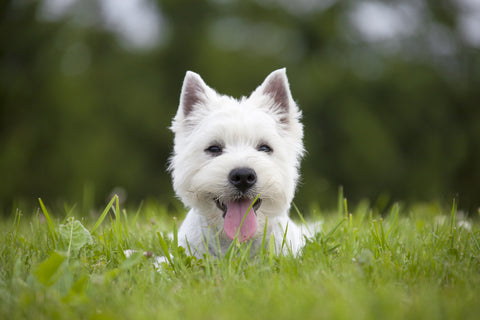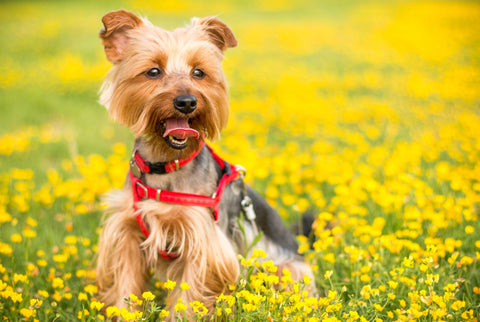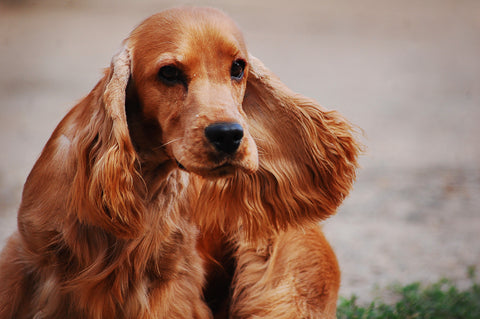
Lintbells fact file: Dog health and vitamin E
Lintbells fact file: Dog health and vitamin E
Vitamin E plays a critical role in your dog's health. But what does it do, and how can you make sure your dog is getting enough? Find out more in our dog health and vitamin E fact file.

What is vitamin E?
Vitamin E, an antioxidant, destroys the free radicals in your dog's body. Free radicals are ‘bad’ atoms that form as part of normal processes in your dog’s body. However, they can go on to cause damage to other cells. Antioxidants – like vitamin E – ‘neutralise’ free radicals and stop them doing this.
Vitamin E also plays a particularly important role in skin health and fertility and is also important for proper functioning of the immune system. It’s a key ingredient in a shiny and luscious coat!
As well as combatting free radicals, Vitamin E also ensures other ingredients in pet foods and supplements stay at their best. It prevents the oxidation of fatty acids in the food which leads to them going off. Like in the body, it accomplishes this by "neutralising" the free radicals which cause rancidity.
Where is Vitamin E found in my dog’s diet?
Vitamin E is found in most good quality dog foods, as well as in leafy vegetables and plant oils. If your dog is eating well, chances are it’s getting a good amount of vitamin E within its normal diet. However, there may be signs if this isn’t true…
How do I know if my dog isn’t getting enough Vitamin E?
If your dog’s coat is looking dull, and he suffers from other skin-related conditions, it could be down to a lack of nutrients such as vitamin E.
Signs could include:
- Excessive moulting
- Thin or balding patches on their coat
- Suffering from dry or flaky skin
- Poor coat condition
If you add cod liver oil, oily fish, linseed oil, olive oil, sunflower oil, or any number of other oils to your dog’s diet for the Omega 3 & 6, he may need more vitamin E. This will help to deal with the free radicals that the oils may create.
How much extra vitamin E does my dog need?
This all depends on the quality of oil that you’re giving your dog. For example, feeding your dog a poor-quality flax oil or a cheap fish oil will require more vitamin E than a higher quality one intended for humans. Poorer quality oils with increased levels of oxidation will contain higher levels of free radicals - so your dog will need more vitamin E.
The exact amounts of vitamin E your dog needs depends upon the levels and precise mix of Omega 3 & 6 oils being added. If you know the precise fatty acid analysis of the oil, you can calculate exactly how much vitamin E your dog needs.
How can I add extra vitamin E to my dog’s diet?
As always, it’s worth checking with your vet before you add anything extra to your dog’s diet. However, if you think your dog could use a helping hand in the vitamin E department, a skin and coat supplement could be the way to go – such as Lintbells YuDERM.
What are the ingredients in Lintbells YuDERM?
YuDERM is a natural coat and skin supplement that is not only packed with vitamin E, but also contains Omega 3 from Golden Flaxseed and Omega 6 from Starflower. YuMEGA combines vitamin E and Omega 3 & 6 to support skin and coat health.
In fact, the level of vitamin E in YuDERM is more than double the minimum requirement. This helps to ensure that there is plenty of natural Vitamin E available for the health of your dog or cat. Vitamin E plays an important role in skin health, so having this naturally available in YuDERM helps to improve your pet's skin condition.

How is YuDERM different to other skin and coat supplements?
Like with all our supplements, we use only the finest natural ingredients. For YuDERM, we do several things to make sure your pet is getting the right amount of vitamin E and Omega 3 & 6:
- We use the highest quality raw materials
- Oil is extracted gently, avoiding heat, light and oxygen to provide extremely high-quality oils
- We use oxygen and light blocking packaging to reduce oxidation
- We ensure high levels of natural Vitamin E
This means you can be confident they have the right blend of Omega 3 & 6 oils and plenty of natural vitamin E to support your pet’s skin health.

Vitamin E is an important part of your pet’s diet, but make sure you do your research. A complete skin and coat supplement could be the way to go to ensure your four-legged friend’s skin and coat health is well supported.
Does your dog (or cat!) have the shiniest coat around? Be sure to share your top tips with us – and maybe a photo. Find us on Facebook or comment below.





